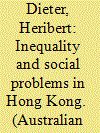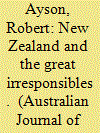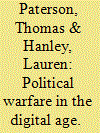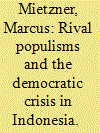|
|
|
Sort Order |
|
|
|
Items / Page
|
|
|
|
|
|
|
| Srl | Item |
| 1 |
ID:
173152


|
|
|
|
|
| Summary/Abstract |
The level of alliance cohesion is measured along the following dimensions of alliance operation: attitudinal, behavioural, and functional. However, it is insufficient to evaluate the level of cohesion only by examining how those indicators have changed over time. If it were sufficient to do so, it would presume the level of alliance cohesion would be bound to become similarly high in cases such as those of the US-Japan and US-Philippines alliances in which the commonly perceived threat is now widely and deeply entrenched. This article argues that the capabilities dimension be included in the list of indicators evaluating the level of cohesion. The US places greater emphasis on encouraging its allied partners to address specific capability gaps, foster trust, and improve jointness and interoperability with the US forces and thus contribute further to the evolution of division of alliance labour in which they take a larger role in both regional and global defense as well as cater for their own needs. The evolving division of labour that has been facilitated—and made possible—by a junior ally's enhanced capabilities has incentivized both the US and its ‘capable’ ally to work together to enhance alliance cohesion and credibility.
|
|
|
|
|
|
|
|
|
|
|
|
|
|
|
|
| 2 |
ID:
173151


|
|
|
|
|
| Summary/Abstract |
In the recent years, the Chinese government under Xi Jinping's leadership has outlined an ambitious economic strategy for China, manifested in the following four key elements: further reform towards the marketisation of its economy, ‘Made in China 2025’, the mega project BRI, and a new model of China–US relations. However, there are severe contradictions between these elements and China has also met many challenges internally and externally when implementing this strategy. After discussing those challenges, this article makes a recommendation for China's strategic direction of its national development in the short term.
|
|
|
|
|
|
|
|
|
|
|
|
|
|
|
|
| 3 |
ID:
173153


|
|
|
|
|
| Summary/Abstract |
The International Military Education and Training (IMET), has given Indonesian military personnel access to U.S. doctrine and tactics. However, due to the dynamics and changes in priorities of interest between the U.S. and Indonesia, the IMET program has experienced a critical period, when for over a decade, from 1992 to 2005, the U.S. Congress imposed a ban on the program for the Indonesian military. The country also adopted an embargo towards Indonesia in responding to the ‘Santa Cruz’ incident in East Timor in 1991. Not only had the embargo limited defence cooperation with the United States, but also with its alliance countries. During the ‘IMET Ban’ period, access to U.S. professional military education was significantly reduced. The ban fully restricted Indonesian military’s development since the country relied on the American military’s doctrines and tactics. The ban further disrupted the U.S.–Indonesia defence relations. Therefore, through desk research, this article uses process tracing approach to qualitatively examine the dynamic of the US–Indonesia defence relations during the ‘IMET Ban’ period. The lessons learned during this period in the article are important to help the current Trump and Widodo administrations navigate their bilateral defence relations.
|
|
|
|
|
|
|
|
|
|
|
|
|
|
|
|
| 4 |
ID:
173150


|
|
|
|
|
| Summary/Abstract |
Many young people in Hong Kong, supported by a large number of middle-aged citizens, are fighting the government in order to preserve Hong Kong’s liberty and relative autonomy from Beijing. However, the question still is why people in Hong Kong are so rebellious, whilst people in comparable Asian societies are not. But differently: Why do Hong Kong citizens continue to fight the regime despite their quite unexpected victory, the withdrawal of the extradition bill? Why do well-to-do bankers, lawyers and office clerks support a movement that is increasingly using violence to support their demands? The full understanding of the situation in Hong Kong requires to view the fight for political freedom in relation to other, deeper socio-economic factors.
|
|
|
|
|
|
|
|
|
|
|
|
|
|
|
|
| 5 |
ID:
173157


|
|
|
|
|
| Summary/Abstract |
New Zealand's willingness to call out irresponsible great power behaviour is a major test for Jacinda Ardern’s promise that her government will stand up for its values internationally. In fact, New Zealand has been weaker on Russia’s irresponsibility in the Ardern era than it was under the National Party-led governments of John Key and Bill English. The situation is reversed, however, for New Zealand's response to irresponsible international behaviour by China from the South China Sea to cybersecurity and human rights. Ardern’s commitments to international tolerance and cooperation have also made for a stronger response to the divisive turn in US foreign policy under Donald Trump. But there has also greater inconsistency in New Zealand's positioning since Ardern became Prime Minister in late 2017. Among the explanations for these trends is the Labour Party’s agreement to hand the foreign affairs and defence portfolios to the New Zealand First Party, which has amplified the contribution to New Zealand policy pronouncements by the Deputy Prime Minister Winston Peters.
|
|
|
|
|
|
|
|
|
|
|
|
|
|
|
|
| 6 |
ID:
173156


|
|
|
|
|
| Summary/Abstract |
The digital age has permanently changed the way states conduct political warfare—necessitating a rebalancing of security priorities in democracies. The utilisation of cyberspace by state and non-state actors to subvert democratic elections, encourage the proliferation of violence and challenge the sovereignty and values of democratic states is having a highly destabilising effect. Successful political warfare campaigns also cause voters to question the results of democratic elections and whether special interests or foreign powers have been the decisive factor in a given outcome. This is highly damaging for the political legitimacy of democracies, which depend upon voters being able to trust in electoral processes and outcomes free from malign influence—perceived or otherwise. The values of individual freedom and political expression practised within democratic states challenges their ability to respond to political warfare. The continued failure of governments to understand this has undermined their ability to combat this emerging threat. The challenges that this new digitally enabled political warfare poses to democracies is set to rise with developments in machine learning and the emergence of digital tools such as ‘deep fakes’.
|
|
|
|
|
|
|
|
|
|
|
|
|
|
|
|
| 7 |
ID:
173155


|
|
|
|
|
| Summary/Abstract |
Viewed as a stable democracy for much of the 2000s and early 2010s, Indonesia has in recent years been part of the global populist surge. In fact, national politics has been marked by competition between three rival populist streams: chauvinism, Islamism and technocratic developmentalism. This article discusses the conditions under which such a three-track populism could emerge in Indonesia. In identifying the drivers of populism, it points to the existence of a major religio-political cleavage, the framing of that cleavage in a narrative of economic inequality, the easy targeting of cultural minorities, and the collaboration of established parties. Drawing from survey data to substantiate its claims, the discussion demonstrates that populist attitudes are spread widely across the ideological landscape; that its intensity is highest at the extreme ends of Indonesia’s Islamist-pluralist spectrum; and that populist citizens are more concerned with purported threats to their identity than the kind of politico-economic hardship that much of the classic populism literature has focused on. Most importantly for Indonesian democracy, the three types of populism have interacted among each other, and with the non-populist political establishment, in a way that has severely undermined the quality of the democratic polity.
|
|
|
|
|
|
|
|
|
|
|
|
|
|
|
|
| 8 |
ID:
173154


|
|
|
|
|
| Summary/Abstract |
Amidst the cacophony of the Trump presidency, is it possible to unearth the logic behind his foreign policy? Do his strategy and tactics stem from him or are they a response to the changing international structure? This article addresses these questions and seeks to evaluate the Trump administration’s foreign policy record on its own terms by examining his methods and objectives through three frames: ‘Art of the Deal’, ‘Make America Great Again’, and ‘Stable Genius’. By applying these frameworks to three cases: (1) migration, (2) NATO funding and (3) trade, the article finds that, in general, the policies and methods of the administration have been unable to achieve the President’s stated goals in the global arena. In conducting this analysis and evaluation, the article makes a novel contribution to understanding the policy and philosophy of the Trump administration’s foreign policy and enhances understanding of the policy outcomes that US diplomacy is attempting to achieve.
|
|
|
|
|
|
|
|
|
|
|
|
|
|
|
|
|
|
|
|
|